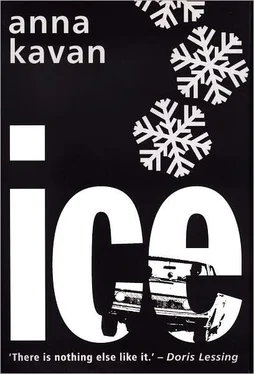The day got colder as it went on, the sky darkened. Rising beyond the mountains behind me, ominous masses of black cloud were converging upon the sea. I watched these clouds, understood their meaning; felt the intensifying cold with increasing dread. I knew it meant only one thing: the glaciers were closing in. Instead of my world, there would soon be only ice, snow, stillness, death; no more violence, no war, no victims; nothing but frozen silence, absence of life. The ultimate achievement of mankind would be, not just self-destruction, but the destruction of all life; the transformation of the living world into a dead planet.
In a sky which should have been cloudless and burning blue the sombre, enormous structures of storm cloud looked inexpressibly sinister, threatening, like monstrous ruins on the point of collapse, hanging impossibly overhead. Icy crystalline shapes began to flower on the windscreen. I was oppressed by the sense of universal strangeness, by the chill of approaching catastrophe, the menace of ruins suspended above; and also by the enormity of what had been done, the weight of collective guilt. A frightful crime had been committed, against nature, against the universe, against life. By rejecting life, man had destroyed the immemorial order, destroyed the world, now everything was about to crash down in ruins.
A gull flew close and cried; I had reached the sea. I sniffed the salt smell, looked over the dark waves to the horizon, saw no wall of ice. But the air was full of the deadly coldness of ice, it could not be far away. I raced across fifty miles of bare land to the town. Above it, the clouds hung lower, blacker, more ominous, waiting for me to arrive. The cold made me shiver perhaps he had already been there. When I slowed down and entered the streets where people had danced all night, I could hardly believe this was the same gay place. The streets were all deserted and silent; no pedestrians, no traffic, no flowers, no music, no lights. I saw sunken ships in the harbour; demolished buildings, closed shops and hotels; a cold grey light that belonged to another climate, a different part of the world; everywhere the imminent threat of a new ice age.
I saw what was in front of my eyes, and at the same time I saw the girl. Her picture was always with me, in my wallet and in my head. Now her image appeared in the open wherever I looked. Her white lost face was everywhere with its too-large eyes, her albino paleness flared like a torch beneath the malignant clouds, drew my eyes like a magnet. She was a shimmer among the ruins, her hair a glittering in the dark day. Her wide eyes of a wronged and terrified child accused me from the black holes of smashed windows. Like a perverted child she ran past, soliciting me with big eyes, tempting me with the pleasure of watching her pain, elaborating the worst imaginings of my desire. The ghostly gleam of her face lured me into the shadows, her hair was a cloud of light; but as I came near her she turned and fled, the silver shifting suddenly on her shoulders, a waterfall glinting in moonlight.
The remains of a roadblock obstructed the entrance to the hotel at which we had stayed. I had to leave the car and walk up the drive. A strong wind, cruelly cold, blew straight off the ice, tore my breath away. I kept glancing at the anthracite-coloured sea to make sure the ice itself was not already in sight. At ground level the exterior of the hotel was unchanged, but higher up the walls were full of great gaping holes, the roof sagged. I went inside. It was cold and dark, no heating, no light, dilapidated chairs and tables arranged as in a café. In spite of fragments of gilt decoration surviving amidst the destruction, I did not recognize the wrecked room.
I heard uneven steps, the tap of a stick, was approached by someone who knew my name. The young man’s appearance was vaguely familiar, but at first I could not place him in the dim light. Suddenly it came back to me while we were shaking hands. ‘Of course, you’re the proprietor’s son.’ The lameness was new and had put me off. He nodded. ‘My parents are dead. Killed in the bombing. Officially I’m dead too.’ I asked what had happened. He grimaced, touched his leg. ‘It was in the retreat. All the wounded were left behind. When I heard I’d been reported killed I didn’t bother to contradict….’ He broke off, gave me a nervous glance. ‘But what on earth brings you back? You can’t stay here, you know. We’re in the area of immediate danger. Everyone’s been told to get out. There are only a few of us old inhabitants left.’
I looked at him; did not understand why he was uneasy with me. He told me the crowds of people I had seen here had left long ago. ‘They almost all got away before war broke out.’ I said I had come in the hope of finding the girl. ‘But I ought to have realized that she would have gone.’ I waited for him to say something about the warden. Instead, he looked awkward, hesitated before he spoke. ‘As a matter of fact, she’s one of the very few who did not go.’ My emotions had been disturbed during the last few seconds; to disguise the fact as much as to make sure my present relief was justified, I asked if any inquiries had been made about her. ‘No.’ He looked blank, seemed to be speaking the truth. ‘Does she still live here?’ Again the reply was ‘No’. He went on: ‘We’ve been using this part as a restaurant, but the whole building’s unsafe. There’s nobody left to do repair work. Anyhow, what’s the use?’ I agreed that the approach of the ice made all such activities futile. But I was only interested in the girl. ‘Where is she living now?’ His hesitation was longer this time, more marked. He was obviously embarrassed by the question, and when he finally answered it, I at once saw why. ‘Quite near, At the beach house.’ I stared at him. ‘I see.’ Everything was clear now. I remembered the house well, it was his home, where he had lived with his parents. He continued uncomfortably: ‘It’s convenient for her. She’s been doing some work here.’ ‘Really? What sort of work?’ I was curious. ‘Oh, helping in the restaurant.’ He sounded evasive, vague. ‘Do you mean waiting on people?’ ‘Well, she sometimes dances….’ As if to avoid the topic, he said: ‘It’s a great pity she didn’t go to a safe place like everyone else, while it was still possible. She had friends who would have taken her with them.’ I replied: ‘Evidently she had friends here she preferred to stay with.’ I watched him closely, but his face was in shadow, his back to the fading light, I could not make out his expression.
All at once I became impatient. I had already wasted too much time on him. She was the one I had to talk to. On my way to the door I asked: ‘Have you any idea where I’d be likely to find her?’ ‘I should think she’d be in her room. She’s not due here till later.’ He limped after me, leaning on the stick. ‘I’ll show you a short cut through the garden.’ I got the impression he was trying to delay me. ‘Many thanks: but I can find my own way.’ I opened the door and went out; shut it between us before he had time to say anything more.
An ice-cold air-stream hit me outside. Dusk was falling, the wind brought crumblings of frozen snow. I did not look for the short cut, but took a path I knew led down to the beach. Frost had killed off the exotic plants I remembered growing beside it: the leaves of palm trees were shrivelled, moribund, blackened, furled tight like rolled umbrellas. I should have been inured to climatic changes; but I again felt I had moved out of ordinary life into an area of total strangeness All this was real, it was really happening, but with a quality of the unreal; it was reality happening in quite a different way.
Читать дальше












